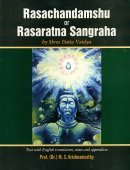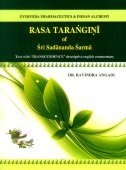Marana, Maraṇa, Māraṇa: 49 definitions
Introduction:
Marana means something in Buddhism, Pali, Hinduism, Sanskrit, Jainism, Prakrit, Marathi, Hindi, Tamil. If you want to know the exact meaning, history, etymology or English translation of this term then check out the descriptions on this page. Add your comment or reference to a book if you want to contribute to this summary article.
Marana has 47 English definitions available.
Alternative spellings of this word include Marna.
Languages of India and abroad
Sanskrit dictionary
[Deutsch Wörterbuch]
Source: Cologne Digital Sanskrit Dictionaries: Böhtlingk and Roth Grosses Petersburger WörterbuchMaraṇa (मरण):—(von 1. mar) n.
1) das Sterben, Tod [Amarakoṣa 2, 8, 2, 85.] [Halāyudha 3, 6.] gṛhapati [Aśvalāyana’s Śrautasūtrāni 12, 6.] [Kātyāyana’s Śrautasūtrāṇi 24, 6, 16.] jana [25, 4, 24. 7, 5. 9. 13, 37. 14, 19.] janane maraṇe [Kauśika’s Sūtra zum Atuarvaveda 141.] [Yāska’s Nirukta 3, 15.] [Chāndogyopaniṣad 3, 17, 5.] [Kaṭhopaniṣad 1, 25.] [Manu’s Gesetzbuch 5, 77. 79. 8, 108.] [Bhagavadgītā 2, 34.] [Mahābhārata 1, 4318. 6032. 3, 2342. 13, 70.] [Rāmāyaṇa 1, 1, 88. 3, 12. 2, 72, 18.] mṛtyuṃ maraṇadharmeṇa yojayeyam [3, 29, 18.] [Suśruta 1, 18, 19. 34, 17. 45, 21. 102, 12. 109, 17.] [SĀṂKHYAK. 18. 55.] [Spr. 159. 311. 446. 452. 1581. 2061. 2646. 2742. 3791. 4697.] [Varāhamihira’s Bṛhajjātaka S. 11, 59. 46, 33.] [Kathāsaritsāgara 36, 80.] [Mārkāṇḍeyapurāṇa 16, 43.] [Caurapañcāśikā 49.] [Pañcatantra 128, 7.] [Sāhityadarpana 64, 4] (garvā ma zu trennen). [Vetālapañcaviṃśati] in [Lassen’s Anthologie (II) 8, 8. 28, 3.] kṣatriyaḥ śastramaraṇaḥ durch Waffen den Tod findend [Mahābhārata 2, 657.] das Ersterben: vidyutaḥ, vṛṣṭeḥ [Aitareyabrāhmaṇa 8, 28.] Vgl. kāmya, dhī, saha, āmaraṇānta . —
2) ein best. Gift, = vatsanābha [Rājanirghaṇṭa im Śabdakalpadruma]; wohl fehlerhaft für māraṇa, wie u. vatsa nābha gelesen wird. —
3) Zuflucht; wohl nur fehlerhaft für śaraṇa [Bhāgavatapurāṇa 4, 24, 56], obgleich drei uns zu Gebote stehende Ausgaben so lesen.
--- OR ---
Māraṇa (मारण):—(vom caus. von 1. mar)
1) n. a) das Tödten [Amarakoṣa 2, 8, 2, 83. 3, 4, 18, 121.] [Trikāṇḍaśeṣa 2, 8, 59.] [Halāyudha 2, 322.] tāvatkṛtvo ha māraṇam prāpnoti so v. a. so oft tödtet man ihn [Manu’s Gesetzbuch 5, 38.] manuṣya [8, 296.] [Harivaṃśa 691.] [KĀM. NĪTIS. 14, 23.] [WEBER, Rāmatāpanīya Upaniṣad 296.] — b) eine die Vernichtung eines Feindes bezweckende Zaubercerimonie [Oxforder Handschriften 97,b,9. 27. 33. 35. 98,a,5. 6. 100,a,40.] tāpajvarādi [98,a,2.] na śastaṃ māraṇaṃ karma [PAÑCAR. 3, 14, 71.] karman [Oxforder Handschriften 97,b,25. 31.] grahamāraṇakarman [WEBER, Rāmatāpanīya Upaniṣad 314.] kṛtya [Oxforder Handschriften 98,a,17.] — c) (sc. astra) Bez. einer best. mythischen Waffe (die Tödtende) [Rāmāyaṇa 1, 29, 19.] — d) Bez. eines best. Processes bei der Darstellung von Metallen [Weber’s Verzeichniss No. 965. fg. 969.] [Oxforder Handschriften 311,b,17. 320,b, No. 760. 321,b, No. 763.] — e) ein best. Gift; s. u. maraṇa 2. —
2) f. ī Bez. einer der 9 Samidh (die Tödtende) [Gṛhyasaṃgrahapariśiṣṭa 1, 27.]
--- OR ---
Māraṇa (मारण):—
1) d) es ist das Calciniren gemeint.
Source: Cologne Digital Sanskrit Dictionaries: Sanskrit-Wörterbuch in kürzerer FassungMaraṇa (मरण):—n. —
1) das Sterben , Tod. maraṇam mit kara Med. sterben [77,16.] Am Ende eines adj. Comp. durch — den Tod findend. —
2) das 8te astrol. Haus [UTPALA] zu [Varāhamihira’s Bṛhajjātaka 1,20.] —
3) das Ersterben , Aufhören. —
4) *ein best. Gift [Rājan 6,225.] Richtig wohl māraṇa. —
5) Zuflucht.
--- OR ---
Māraṇa (मारण):——
1) n. — a) das Tödten , Umkommenlassen [Āpastamba’s Dharmasūtra] ṇaṃ pra-āp den Tod erleiden. — b) eine die Vernichtung des Feindes bezweckende Zauberceremonie. — c) eine best. mythische Waffe. — d) das Calciniren [Bhāvaprakāśa 2,83.] —
2) f. ī Bez. einer der neun Samidh.
Sanskrit, also spelled संस्कृतम् (saṃskṛtam), is an ancient language of India commonly seen as the grandmother of the Indo-European language family (even English!). Closely allied with Prakrit and Pali, Sanskrit is more exhaustive in both grammar and terms and has the most extensive collection of literature in the world, greatly surpassing its sister-languages Greek and Latin.
See also (Relevant definitions)
Starts with (+89): Marana-kantacastiram, Marana-vakkumulam, Maranaa, Maranabhaya, Maranabhayahara, Maranabhimukha, Maranabhiruka, Maranabhojana, Maranacacanam, Maranacani, Maranacatanam, Maranacaucam, Maranaceshtai, Maranacetana, Maranachinta, Maranachitta, Maranacinta, Maranacitta, Maranacivan, Maranacucam.
Ends with (+72): Abhijnanamarana, Ahevamarana, Akalamarana, Akalim-marana, Amarana, Antaramarana, Anumarana, Anusmarana, Apamarana, Apasmarana, Asannamarana, Asmarana, Avismarana, Balabalamarana, Balamarana, Caramarana, Caukaticem Marana, Charmarana, Dagdhamarana, Dayamarana.
Full-text (+582): Sahamarana, Hayamarana, Proshitamarana, Maranakarman, Amaranantika, Maranaja, Marananta, Amarananta, Maranabhaya, Maranatmaka, Anumaranam, Durmarana, Maccumarana, Maranaya, Turmaranam, Prajnayate, Remda, Maranakritya, Amaranam, Momentaneity.
Relevant text
Search found 90 books and stories containing Marana, Mara-nā, Mara-na, Maraṇa, Māraṇa, Maraṇā, Maranā, Māranā, Māraṇā; (plurals include: Maranas, nās, nas, Maraṇas, Māraṇas, Maraṇās, Maranās, Māranās, Māraṇās). You can also click to the full overview containing English textual excerpts. Below are direct links for the most relevant articles:
Garga Samhita (English) (by Danavir Goswami)
Verse 4.11.16 < [Chapter 11 - The Story of the Gopīs that were Residents of...]
Verse 6.1.5 < [Chapter 1 - Jarāsandha’s Defeat]
Tattvartha Sutra (with commentary) (by Vijay K. Jain)
Verse 5.20 - Another function of the matter (pudgala) < [Chapter 5 - The Non-living Substances]
Verse 7.22 - The practice of dispassionately abandoning one’s body (sallekhanā) < [Chapter 7 - The Five Vows]
Verse 5.21 - The function of the souls (jīva) < [Chapter 5 - The Non-living Substances]
Sahitya-kaumudi by Baladeva Vidyabhushana (by Gaurapada Dāsa)
Text 4.40 < [Chapter 4 - First-rate Poetry]
Text 7.11 < [Chapter 7 - Literary Faults]
Text 5.10 < [Chapter 5 - Second-rate Poetry]
The Great Chronicle of Buddhas (by Ven. Mingun Sayadaw)
Part 11 - Dependent Origination: Paṭiccasamuppāda < [Chapter 42 - The Dhamma Ratanā]
Part 10 - Mahāvajira Insight Knowledge (Vipassanā-ñāṇa) < [Chapter 7 - The Attainment of Buddhahood]
Part 7 - The Great Homage paid by the Devas and Brahmās < [Chapter 7 - The Attainment of Buddhahood]
Chaitanya Bhagavata (by Bhumipati Dāsa)
Verse 1.6.128 < [Chapter 6 - The Lord Begins Studying and His Childhood Mischief]
Verse 2.10.42-044 < [Chapter 10 - Conclusion of the Lord’s Mahā-prakāśa Pastimes]
Verse 2.10.41 < [Chapter 10 - Conclusion of the Lord’s Mahā-prakāśa Pastimes]
Manusmriti with the Commentary of Medhatithi (by Ganganatha Jha)
Verse 5.38 < [Section VI - Lawful and Forbidden Meat]
Verse 6.45 < [Section VI - Procedure of going forth as a Wandering Mendicant]
Related products





